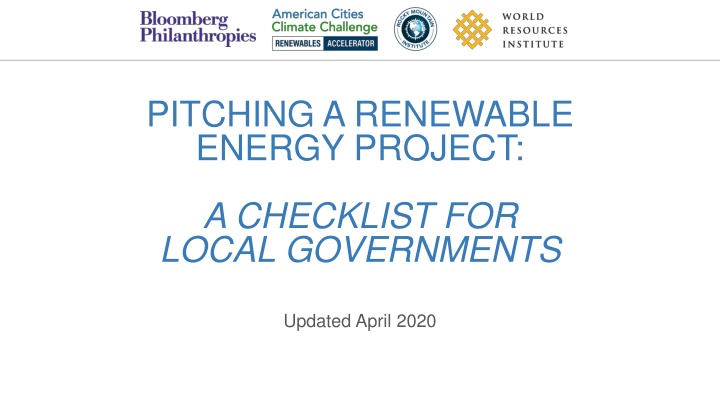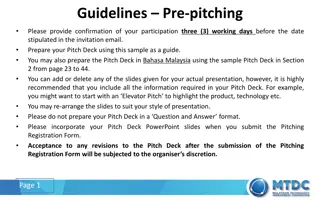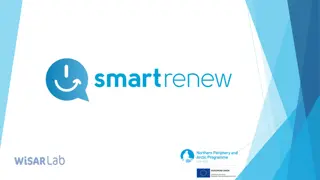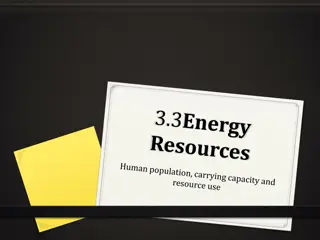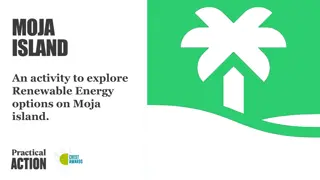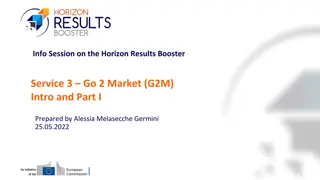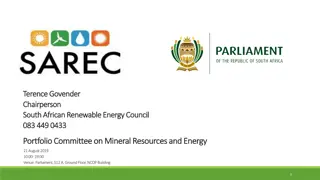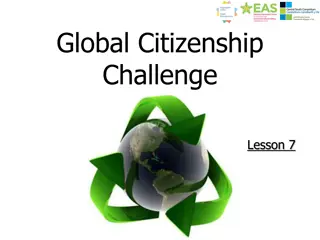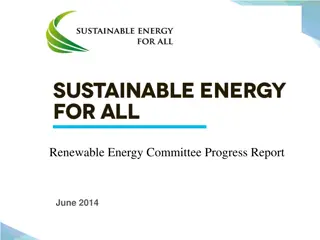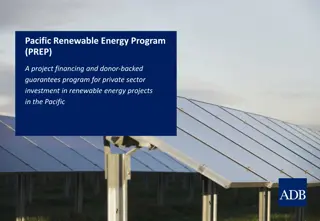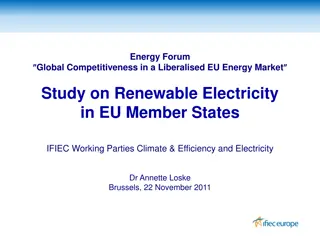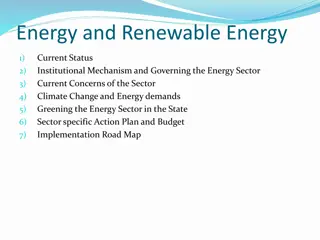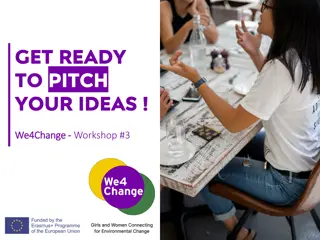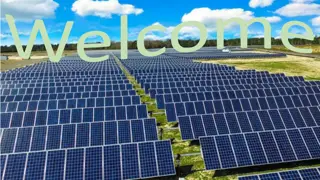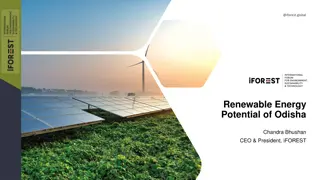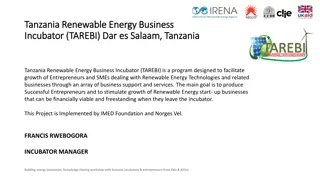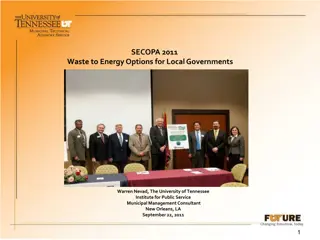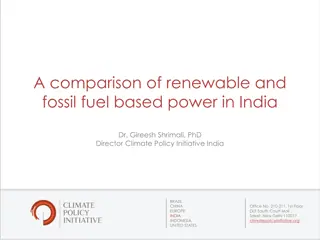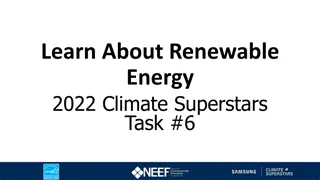Renewable Energy Project Pitching Checklist for Local Governments
Designed for local government staff, this checklist addresses key issues related to pitching a renewable energy project, such as stakeholder considerations, target audience tailoring, political factors, and meeting format. By utilizing this checklist along with available resources, local governments can increase the likelihood of project approval and success.
Download Presentation

Please find below an Image/Link to download the presentation.
The content on the website is provided AS IS for your information and personal use only. It may not be sold, licensed, or shared on other websites without obtaining consent from the author.If you encounter any issues during the download, it is possible that the publisher has removed the file from their server.
You are allowed to download the files provided on this website for personal or commercial use, subject to the condition that they are used lawfully. All files are the property of their respective owners.
The content on the website is provided AS IS for your information and personal use only. It may not be sold, licensed, or shared on other websites without obtaining consent from the author.
E N D
Presentation Transcript
PITCHING A RENEWABLE ENERGY PROJECT: A CHECKLIST FOR LOCAL GOVERNMENTS Updated April 2020
An Introduction to Pitch Deck Resources Who is this checklist designed for? Local government staff that are preparing to pitch a renewable energy project or strategy to key stakeholders What issues does this checklist address? This checklist provides prompts and suggestions on the following key issues: Key Stakeholders: Have you considered the key stakeholders in your community? (Page 3-4) Target Audiences: Have you tailored your strategy and content to your target audience? (Page 5) Local Priorities and Politics: Have you identified and addressed relevant political factors that may help or impede your project? (Pages 6-7) Meeting Format: Have you considered the format of the meeting in which you will be making your pitch? (Page 8) What is the purpose of this checklist? To provide a list of critical issues to address and potential strategies to use in order to set yourself up for success and increase the likelihood that your project will be approved What other resources are available? This check list is designed to complement other resources available at https://cityrenewables.org/tools-resources/, including the following: When should you use this checklist? Early in the process: review this checklist first to familiarize yourself with the components and suggestions 1-3 months before your pitch: review the checklist regularly to plan and adapt as needed On-Site Pitch Deck Template Off-Site PPA Pitch Deck Template Procurement Guidance 2
Key Stakeholders Consider which stakeholders you should engage to understand their concerns or ensure their support. Important stakeholders to consider may include: Important stakeholders to consider may include: Elected Officials Local Government Agencies/Departments Regional Governments, Universities, and Institutions Suggestion: Utilities Consider creating a clear, one-page briefing sheet to help elected officials and other stakeholders quickly and accurately understand the project. You may wish to highlight key project details such as the project s objectives, costs, sources of funding, co-benefits (e.g. local job creation), timing, and partners as well as your contact information. Community & Advocacy Groups Residents & Neighborhood Associations Property Owners, Renters, Landlords Businesses, Employers, and Employees Project Developers Local Press 3
Instructions: Key Stakeholders Mapping Framework To use this as a custom tool, simply click on the table, right click (PC) or Control click (Mac) to open options for the menu of options, select Worksheet Objects or Edit Data in Excel and select Open . Consider using a framework to weigh the influences, interests, and priorities of core stakeholders. Note that the stakeholders and information contained in the table below are illustrative examples and should not be used as a basis for your own decisions. STAKEHOLDER STANCE INFLUENCE INTEREST ROLE IN DECISION MAKING VALUE PROPOSITION ENGAGEMENT STRATEGY ROLE IN What does this stakeholder group stand to gain? What do you need to do to engage this stakeholder? What channels will you use? IMPLEMENTATION Use Dropdown List Score 1-10 Score 1-10 S Mayor Neutral 10 3 10 5 Leadership, sustainability Share updates at event tomorrow City Council Supportive 8 6 10 3 Goals, climate action progress Discuss in upcoming work session Finance Department Neutral 8 3 9 7 Budget, planning, contracts Follow up from 1:1 meeting Historic preservation, affordability, aesthetics Neighborhood Association Opposed 3 7 2 3 Meet with sustainability task force chair Environmental NGO Strongly Supportive 4 10 2 1 Climate change, local action Inform via website updates Leadership, education and visibility of project Local University Supportive 6 6 2 1 Discuss in regional working group [other] 4
Target Audiences Consider the following topics and questions as you adapt your presentation for a specific audience. Topics Questions What are the main motivations of your target audience? How can you tailor your pitch to address these top values or interests first? Are there co- benefits (e.g., jobs, visibility, education) that could be highlighted for this audience? Is your audience more concerned with short-term or long-term interests? If this (or a similar project) has been proposed before, are decision-makers bringing any preconceived notions to the table that you should be ready to address? Is your audience already familiar with the sustainability goals and this project? What additional context, relevant successful examples, or lessons learned might be useful to provide? What technical knowledge does your audience have already? Depending on your audience s expertise, is there an analogy you can use to better explain this project to them? What additional information should you provide regarding renewable energy, climate change, and energy procurement? Is your ask articulated clearly and concisely? Values and Interests Project Familiarity Level of Technical Ability Clarity 5
Local Priorities and Politics Confirm that you have considered these potential impacts of your project before you proceed. How does this impact your local government? How does this impact taxpayers and voters? How does this impact local leadership? What are the tangible benefits of the project? Can the community understand the direct and/or indirect benefits of this project? If this has been proposed or acted on before, how was it received? Will this impact the local economy or workforce? Will this achieve a major goal or campaign promise? How much time, political capital, and resources will leadership need to devote to this? Will this impact upcoming elections? Is there existing buy-in for the goal that this project is meant to address? What are the impacts on daily operations? How much is this expected to cost? Are costs or savings upfront or distributed over time? Is this an investment that will result in multi-year benefits to operations? Are there legal issues to consider? 6
Local Priorities and Politics Consider how the following local political factors may impact your project and prepare to speak to specifics. District-Specific Considerations If your community is divided by districts, which districts will be directly impacted and how will their representatives and residents react? If your project is only in one district, how can you convey co-benefits to residents in other districts? Suggestion: If you are less familiar with your target audience, ask your peers or attend a public meeting, if possible, in advance of your pitch to observe personalities, preferences, format, questions, and likely level of participation. Perception and Opposition Are any stakeholders strongly opposed to the project? Are you prepared to read the room and adapt if your audience reaction is not what you expected? Have any of your peers tried to do something similar? What results, data, and/or lessons learned apply to your proposed project? 7
Meeting Format Consider how the meeting format might impact your presentation and adapt your pitch accordingly. Formality Publicity and Press Is this a formal meeting requiring a vote, or is it a more informal work session? Are you aware of meeting or disclosure rules that may impact your pitch? Will you have an opportunity at an informal work session to gauge general interest or offer advance notice to certain officials? Will the meeting be closed or open to the public? Will local press be in attendance? Could this project be newsworthy to the community? Is your communications team involved? Remember, anything you say publicly is on the record. Will you have an opportunity to talk with your local press? If so, this is an opportunity to share prepared talking points, FAQs, or a briefing sheet and add off the record insights. If you expect public comments from stakeholders in this setting, how do you plan to address any questions or concerns? 8
